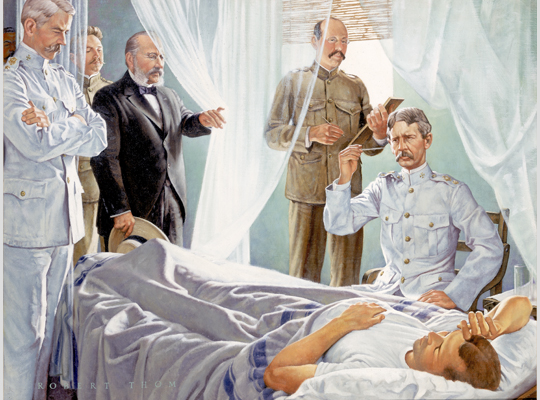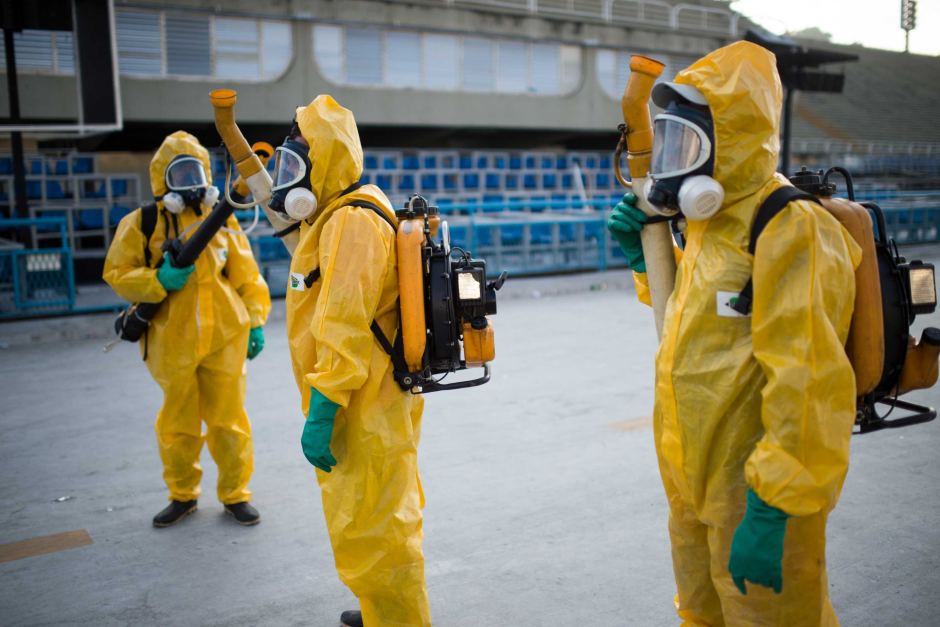By Grant Mercer
Today’s Zika outbreak is not the first time mosquitos have caused an international panic. In 1841, the British ship HMS Eclair docked in Sierra Leone to replenish their dwindling supplies. After filling their holds, they began steaming back toward England, but unknowingly were leaving with far more than hard tack and whale oil. While on a one-day shore leave, the ship’s sailors had come under onslaught by one of man’s deadliest assailants – the mosquito.
After losing two-thirds of its crew, the HMS Eclair sought refuge on Portugal’s Cape Verde. Within a week, yellow fever had jumped the confines of the wooden ship and spread throughout the island, ultimately killing one-third of its residents. By the time the Eclair finally reached its English homeland, global political leaders were in an uproar. In a never-ending cycle of blame, Portugal faulted Great Britain for negligence, Great Britain charged Sierra Leone with failing to protect docked ships from pestilence, while Sierra Leone pointed the finger at other African nations for originating yellow fever.
The political furor continued on for a decade. In the name of disease containment, seclusion became an underhanded tactic as governments imposed quarantines on foreign vessels. Many Mediterranean ports completely barred British ships. Politicians attested that it was only done in the name of preventing yellow fever’s spread and impeding the trade of rival countries was merely a side benefit. Colonial commerce was waylaid by the politics of plagues, rather than guided by medical science.
Over 150 years later, epidemics remain fertile breeding grounds for political fodder. Two years ago, the world was once again held captive by a looming public health crisis – the threat of Ebola. The largest outbreak of its kind in history, the epidemic was responsible for over 11,000 deaths, mostly in three African nations – Liberia, Sierra Leone, and Guinea. Although the risk to Americans was miniscule, far less than the danger of being crushed by an elevator, fear took hold. After the first U.S. patient was diagnosed in Dallas, political leaders stepped forward with the solution to keep Americans safe – a travel ban.
Republican senators Ted Cruz (TX) and Thom Tillis (NC) led the charge, demanding that the White House immediately ban all direct travel from these three countries in order to stem the spread of Ebola. Current presidential candidate Donald Trump added that if the flights were not stopped, the plague would start and spread inside our borders.
The question of travel bans morphed into a pre-election litmus test for candidates. Democrat Senator Jeanne Shaheen (NH), facing steep criticism from her Republican challenger, acknowledged that she didn’t think a travel ban made sense, but would support travel bans if they made Americans feel safer. Democrat Andrew Cuomo (NY), engaged in a not-even-close gubernatorial race, embraced a travel ban after his Republican opponent chided him for a lack of leadership in the fight for public health.
There was just one problem with the proposed travel ban: there were no direct flights to the U.S. from these African nations. In fact, Thomas Duncan, the Dallas patient, had arrived in the U.S. via a flight from Belgium. In addition, Ebola cannot be transmitted until the patient shows symptoms and nears death, rendering travel bans nearly useless. It is highly doubtful that a passenger in the final stages of Ebola, bleeding from every orifice of his body, would be allowed onto a plane. A travel ban, while providing a feel-good measure to American citizens, was essentially a toothless political solution to a scientific problem. As Susan Grant, chief nurse executive for Emory Healthcare, noted: “We can either let our actions be guided by misunderstandings, fear and self-interest, or we can lead by knowledge, science and compassion.”
Now another potential plague – the Zika virus – has crossed our southern border. First discovered nearly 70 years ago in Uganda, Zika is spreading across Latin America at an ever-increasing rate, leaving behind a trail of birth defects. In Brazil alone, there were 4,000 babies born with Zika-caused microcephaly in the last three months of 2015. Compare that to the 150 confirmed cases from the entire year before.
According to the CDC, there are now nearly 600 pregnant women in the continental U.S. testing positive for Zika. A mere two months ago, there were just four confirmed cases. In Puerto Rico, that number of cases among pregnant women is now 1,000. Most of these cases were likely caused by local mosquitos.
In February 2016, President Obama requested $1.9 billion to fight Zika. Three months later, $1.1 billion in funding, a bipartisan compromise, was approved by the Senate. However, the House added provisions weakening Environmental Protection Agency water regulations and defunding Planned Parenthood and other women’s health clinics. These poison pills sent a political message: Zika solutions would be held hostage until the ransom for their causes had been paid.
Many in Congress feared the funds ear-marked for Zika research would finance abortions for infected women. “This push for more abortion access is heartbreaking,” lamented Representative Jeff Duncan (SC), failing to see that the real push was to ensure the delivery of healthy babies. Despite assurances by Paul Ryan, Speaker of the House, that no Zika funds would be spent on abortions, the bill failed to pass. The next day, Congress left for a seven-week vacation. In the words of CDC Director Tom Frieden, “This is no way to fight epidemics.” Congress, returning to work on September 6, will find an unprecedented CDC travel advisory for visitors to Miami, Zika mosquitos continuing their northward push, and testing positive for Zika every single day.
Zika will certainly not be the last health care crisis faced by the United States. A 2016 International Rescue Committee (IRC) report noted that previous reports on Ebola shared one weakness – neglecting to recognize the role of politics. While the public’s fears, both real and perceived, can have a political impact and should be addressed, scientific facts must not be ignored. By taking stock of past global health scares such as yellow fever and Ebola, political leaders can better handle the response needed today to combat Zika while also laying down the defenses for the health crises yet to come.


